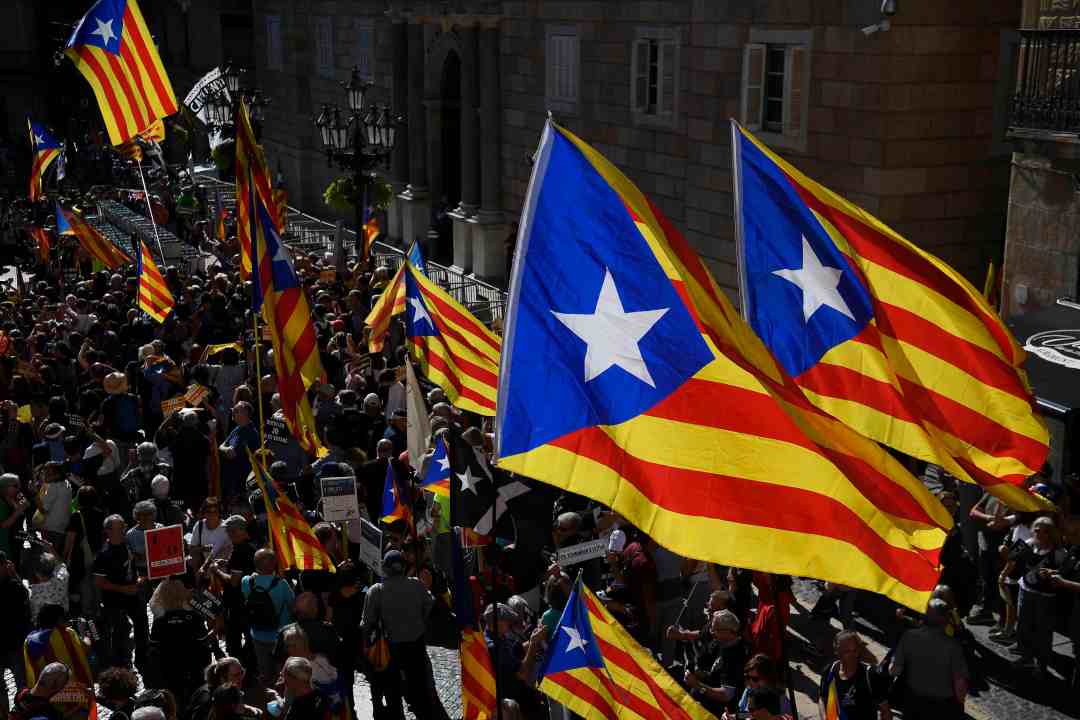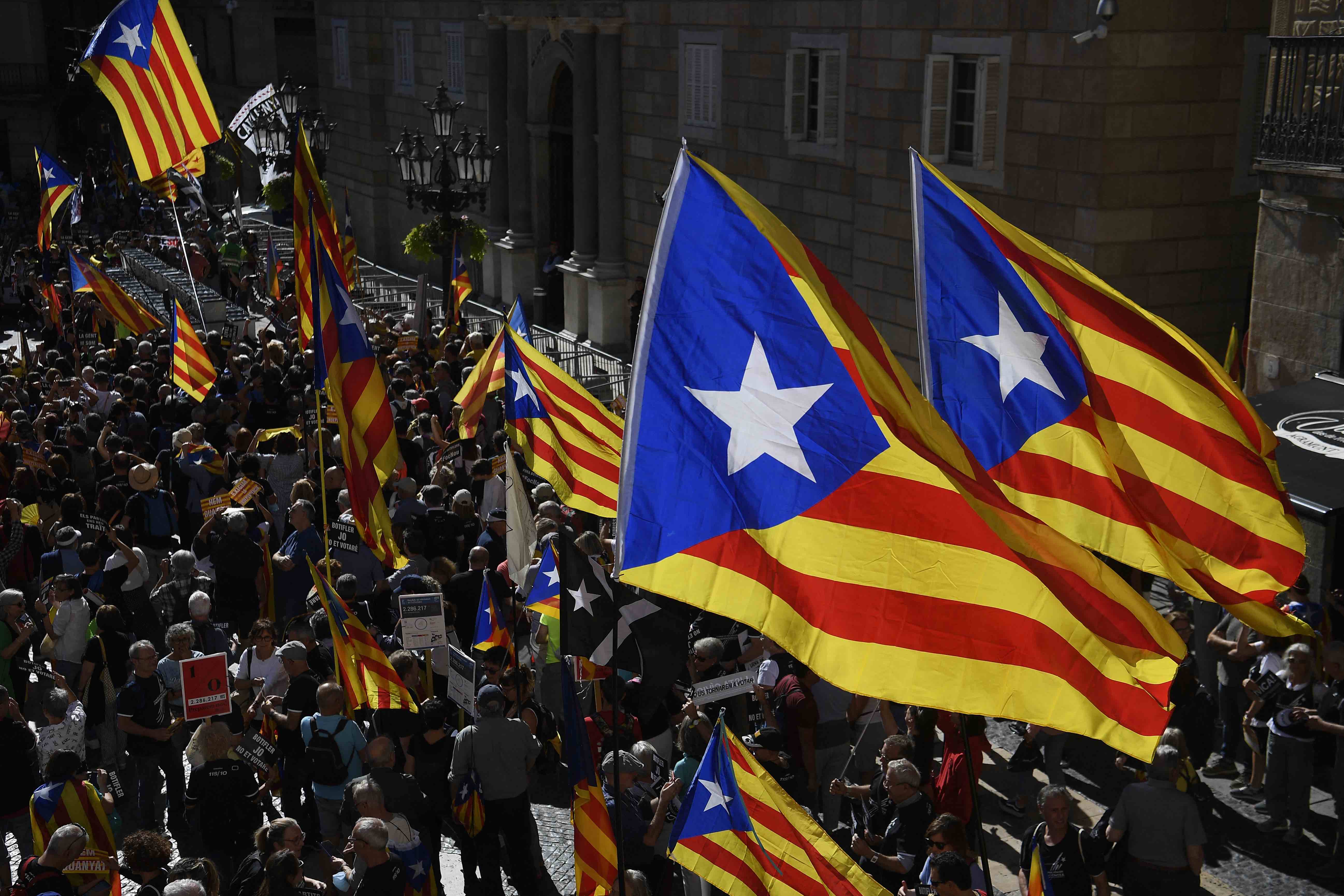Last week’s Supreme Court ruling on Scottish independence will offer scant encouragement to separatists in Catalonia. The crux of the judgment – that Holyrood’s devolved powers do not stretch as far as being able to hold an independence referendum without consent from Westminster – also highlights the problem for Catalan secessionists, who have yet to secure Madrid’s approval for a vote on divorcing Spain.
Nicola Sturgeon has said she will respect the judgment. Similar prohibitions, though, haven’t stopped Catalonia’s separatists, who are in many ways more rebellious than their Scottish counterparts. In 2017, Spain’s Constitutional Court ruled that an independence referendum planned by Catalonia’s then-president, Carles Puigdemont, would be illegal. Puigdemont blazed ahead anyway and in the resulting vote, held on 1 October, 92 per cent chose independence. The referendum’s orchestrators spent three and a half years in prison for disobeying the court’s ruling (a fate that Puigdemont avoided by fleeing to Belgium), before being pardoned and released by Spanish Prime Minister Pedro Sánchez last summer.
In Scotland and Catalonia, the path taken by separatists just became much tougher to navigate
By contrast, Catalonia’s methodical President, Pere Aragonès, is comparable with Sturgeon in his approach to secession Eschewing dramatic, unilateral tactics, Aragonès instead hopes to gain Madrid’s permission to hold a legal independence referendum. But Sánchez has said that he’s bound by the Spanish constitution, a document from 1978 which arguably makes it harder for him to grant such a vote than it would be – or has been – for any British prime minister.
Perhaps recognising the frailty of a case based on UK legislation, the SNP’s lawyers tried to justify another Scottish independence referendum under international law. They cited Quebec, the former French and British colony in which two votes on seceding from Canada – held in 1980 and 1995 – both returned a ‘No’ (by 59.5 per cent and 50.5 per cent, respectively).
The Supreme Court’s judgment on this aspect of the SNP’s argument, though, also applies to Catalonia. Lord Reed ruled that there are two situations in which a territory might claim the right to secede under international law – if it’s a ‘former colony’ or if it’s under ‘foreign military occupation’. But Catalonia, like Scotland, is neither a ‘former colony’ (unless, as some of the more hardcore separatists maintain, Madrid is the coloniser), nor is it under ‘foreign military occupation’. The latter claim would have been easier to make between 1936 and 1975, when Catalan culture was ruthlessly oppressed by fascist dictator Francisco Franco.
Nevertheless, Catalonia has had some support from the international community. In August, the UN Human Rights Committee found that Spain had violated the political rights of the secessionists who organised the 2017 referendum by suspending them from public office prior to their trial and conviction more than a year later. Although this ruling seemed to bolster the separatists’ claim that they’re up against a repressive state, it hardly constituted recognition that they have a right to independence under international law. The EU has also refused to become involved with the battle between Madrid and Barcelona, seeing it as a purely domestic affair.
More craftily, the SNP’s lawyers argued that any future referendum on Scottish independence would be purely ‘advisory’. Lord Reed rightly saw through this strategy, ruling that an authorised referendum would have important consequences for a ‘constitution and political culture founded upon democracy’. Indeed, it’s hard to imagine either Sturgeon or Aragonès, armed with a ‘Yes’ generated by a legal vote, taking no further action – perhaps rightly so. A pre-approved referendum labelled as merely ‘advisory’ would carry much more force than a large-scale opinion poll.
Spain’s government and judiciary took the same view in November 2014, when Catalonia’s then-president Artur Mas staged what he dubbed a ‘process of citizen participation’ – i.e. a referendum in all but name. For defying the Constitutional Court and holding the vote, in which 80 per cent opted for independence, Mas was banned from public office for two years and fined €36,000 (about £31,000). The point is that in Spain and the UK, any independence referendum granted by the central government, precisely for that reason, would be more than just ‘advisory’.
That same year, of course, Scots didvote on independence with Westminster’s approval: a ‘once in a generation’ act which temporarily gave Holyrood the power to hold a referendum. Sturgeon seems to have forgotten the result of that vote when she talks of securing a way for Scots to democratically express their will. She’s also forgetting the polls, which indicate that, even post-Brexit, most of Scotland favours remaining in the UK, albeit by a slim margin. The same is true in Catalonia, where support for secession has dropped to 38.8 per cent, down from 48.7 per cent just after the 2017 vote (although most Catalans do support another, legal referendum). In other words, it’s far from clear whether either Scottish or Catalan separatists would get the result they want, even if a referendum was allowed.
The Supreme Court ruling highlights not only the Catalan equivalents of Holyrood’s constitutional limitations, but also suggests that international law wouldn’t provide an effective recourse for either camp of secessionists. In Scotland and Catalonia, the path taken by separatists just became much tougher to navigate.







Comments